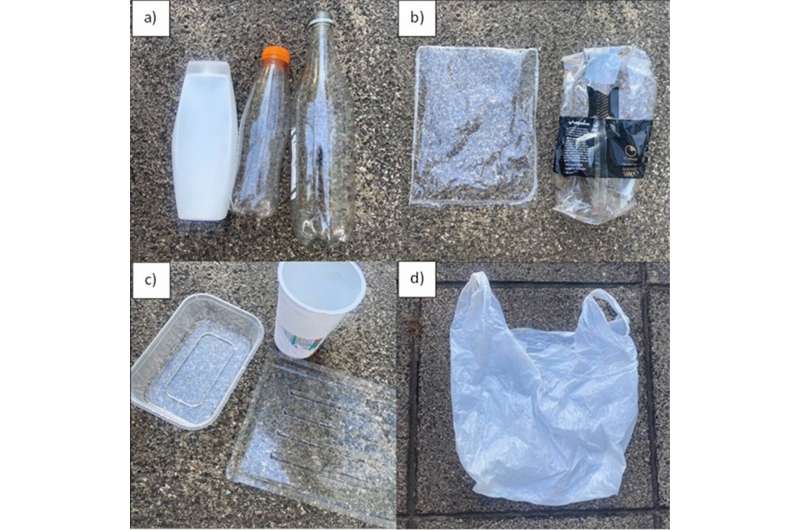This article has been reviewed according to Science X's editorial process and policies. Editors have highlighted the following attributes while ensuring the content's credibility:
fact-checked
peer-reviewed publication
trusted source
proofread
UK study examines coastal city attitudes about recycling

Coastal city residents would like to do more to reduce their single-use plastic waste and they are trying to recycle more, even trying to recycle items that simply can't be recycled, often called "wish-cycling."
But they feel unable to do so due to the current infrastructure challenges and accessibility barriers they face, a new report has found.
The study has also found that while young people are concerned about the use of plastic, their consumer behavior often contradicts their beliefs.
Researchers from the University of Portsmouth's Revolution Plastics initiative surveyed 400 permanent residents in the city. They were questioned on their plastic consumption, purchase, use and disposal habits.
Researchers examined what influenced people's attitudes and behaviors towards plastic and what motivated or constrained their ability to reduce, reuse and recycle what they use.
Ninety percent of people agreed it was important to recycle and 83% felt that littering was a serious problem that needed addressing in Portsmouth. Results indicate that if there were more recycling options available, 79% would recycle more.
However, there were obvious barriers to recycling, and people felt there was a lack of information and opportunity for recycling, with 65% of people admitting they often did not know how or where to recycle plastic items.
Portsmouth is a densely populated coastal city, with 5,315 people per sq. km in 2020 (Office for National Statistics 2021). This makes it the second most densely populated city in the U.K. after London (5,727 people per sq. km in 2020; Office for National Statistics 2021).
Portsmouth is also the U.K.'s only island city, and the immediate proximity of the city to the ocean carries multiple pollution risks, including the erosion of historic landfill sites and beach litter.
Portsmouth has a limited recycling curbside collection system. Currently, only paper, card, plastic bottles, metal cans, tins and aerosols are recycled (Portsmouth City Council 2022). The current recycling rate of all waste for Portsmouth is 24.7%, one of the lowest in the U.K. and considerably lower than the national average of 46.2%.
Professor Steve Fletcher, Director of the Global Plastics Policy Center and Revolution Plastics at the University of Portsmouth says, "As both a coastal city and the second most densely populated environment in the U.K., Portsmouth can provide critical insights into the role of plastics in everyday life.
"These include the challenges of managing plastic waste in a tightly packed urban setting. Understanding how people use plastic items within households is important to inform effective policy development, particularly with the emerging and developing global plastic treaty."
Another important finding was the impact of age on the results. The 31–50 years age group were found to be more regularly shopping in Portsmouth zero-waste shops than their counterparts, while the oldest age group (over 50 years) reported being less aware and less willing to shop in these retailers. Younger respondents (less than 30 years) were more concerned about plastic waste entering the ocean than their older counterparts (over 50 years).
Broadly speaking the younger residents were more concerned about the issue of single use plastic waste, however this was not backed up by their plastic purchase and use habits. Conversely, the older generation, who claimed not to be as concerned, often purchased fewer plastic items, particularly plastic bags. 85% of respondents aged 51 years and above purchased zero plastic bags in an average week, compared to 39% of the youngest age group (less than 30 years).
Other social and economic demographic variables such as a resident's location within Portsmouth, income and vehicle ownership were potential indicators of individuals' attitudes, accessibility and incentives towards reducing plastic purchases and recycling their plastic waste.
Lead researcher, Stephanie Northen from Revolution Plastics at the University of Portsmouth, says, "Our findings show that although consumers have a role to play in plastic use and recycling, their behavior is heavily influenced by factors which are largely out of their control, such as price and availability.
"Ultimately it is not consumers who should be responsible for systemic change. This responsibility lies with those who are in charge of plastic policy."
More information: Stephanie Lucky Northen et al, From shops to bins: a case study of consumer attitudes and behaviours towards plastics in a UK coastal city, Sustainability Science (2023). DOI: 10.1007/s11625-022-01261-5
Journal information: Sustainability Science
Provided by University of Portsmouth



















